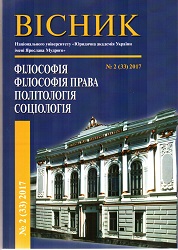ЩО ТАКЕ «ДЕФЕКТНІ ДЕМОКРАТІЇ» І ЯКИМИ ВОНИ БУВАЮТЬ
WHAT IS «DEFECTIVE DEMOCRACIES» AND WHAT THEY ARE
Author(s): O. I. RomanyukSubject(s): Civil Society, Governance, Political behavior, Politics and society, History and theory of political science, Methodology and research technology, Inter-Ethnic Relations
Published by: Національний юридичний університет імені Ярослава Мудрого
Keywords: defective democracy; embedded; democracy; defects of democratic governance; exclusive democracy; enclave democracy; illiberal democracy; delegative democracy;
Summary/Abstract: This article analyzes the concept of defective democracy by German political scientist Wolfgang Merkel. Its development was caused by the need for a clearer distinction of new imperfect democracies, on the one hand, from the liberal constitutional democracies, and on the other hand, from autocracies, that mask their identity by democratic facade. The author pays attention to some incorrect interpretations of this concept, namely: the interpretation of defective democracies as the only transitive mode; the treatment of them as a specific kind of authoritarian regimes; the spread of this concept to all forms of hybrid regimes.The author analyzes in the detail the essence of this concept, relying on the works of the founders (Wolfgang Merkel, Hans-Jürgen Puhle, Aurel Croissant, and Peter Thiery) He emphasizes that the defects of democratic governance are of constitutional and legal nature and they are detected by comparing the imperfect democracies to established liberal democracies that within this concept are defined as «embedded». Democracy defects are deviations from the standards of democratic governance, copied from the current political system of liberal constitutional democracies. The political regimes with such defects are identified as defective democracies. The article examines the sub-types of defective democracies, namely:Exclusive democracy that excludes some groups and/or individuals from the democratic electoral system;Enclave democracy under which certain segments of democratic governance are controlled by private forces;Illiberal democracy, within which there are some violations of group rights and individual freedoms in favor of the social majority; Delegative democracy which violates the system of checks and balances and the executive takes precedence over legislative and judicial.However, the regimes with such deficiencies remain democracies, if the significant defects are only part of regime, but not penetrating it through, denying the very meaning of democratic governance. Simultaneously, democratic defects in one partial regime to some extent are reflected also on the other, impairing the democratic functioning of the entire political regime.Finally, the author concludes that this concept is of great theoretical value for the reform of the modern Ukrainian political system. He stresses that a thorough analysis of the Ukrainian political system’s shortcomings in the context of a defective democracy concept is one of important tasks for the national political science.
Journal: Вісник НЮУ імені Ярослава Мудрого. Серія: Філософія, філософія права, політологія, соціологія
- Issue Year: 33/2017
- Issue No: 2
- Page Range: 114-123
- Page Count: 10
- Language: Ukrainian

